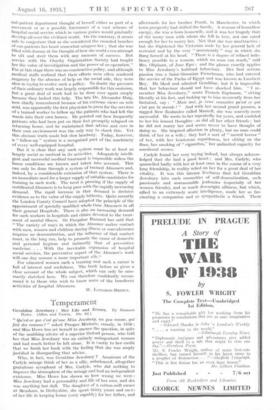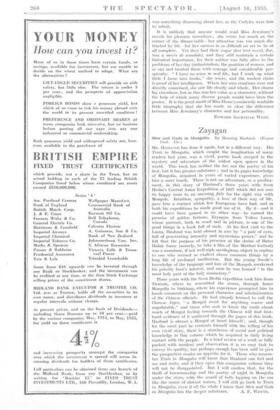Temperament
Geraldine Jewsbury : Her Life and Errors. By Susanne Howe. (Allen and Unwin. IN. 6d.)
Qu'est-ce que c'est qu'une Miss Jewsbury, tot peu rousse, qui fait des romans?" asked Prosper Merimee, crossly, in 1850 ; and Miss Howe has set herself to answer the question, in spite of the snubbing advice of a superior Oxford person, who told her that Miss Jewsbury was an entirely unimportant woman and had much better be left alone. It is vastly to her credit that we finish her book with the feeling that she was amply justified in disregarding that advice. Who, in fact, was Geraldine Jewsbury ? Amateurs of the Carlyle menage think of her as a silly, unbalanced, altogether gratuitous sycophant of Mrs. Carlyle, who did nothing to improve the atmosphere of the manage and had no independent existence. Miss Howe has shown us how wrong we were : Miss Jewsbury had a personality and life of her own, and she was anything but dull. The daughter of a cotton-in ill owner at Measham, in Derbyshire, she spent thirty years and mcra of her life in keeping house
(very capably) for her father, and
afterwards for her brother Frank, in Manchester, to which town prosperity had shifted the family. A woman of boundless energy, she was a born housewife, and it was her tragedy that of the many men with whom she fell in love, not one cared enough for her to marry her Not that she-was unattractive ; but she frightened the Victorian male by her general lack of restraint and by the very " unwomanly " way in which she flung herself at his head. " There is a degree of refined inder. limey possible to a woman, which no .man can reach," said Mrs. Oliphant, of Jane Eyre; and the phrase exactly appliek to Miss Jewsbury's habitual behaviour. Her first serious passion was a Saint-Simonian Frenchman, who had entered the service of the Paella of Egypt and was known as Lambert Bey: He liked and admired Geraldine, but it is impossible that her behaviour should not have shocked him. " I re- member Miss Jewsbury," wrote Francis Espinasse, " sitting literally at his feet, and looking up to him reverently from her footstool, say : " Mais nioi, je 'mum .connaitre qu'est ce qua c'est que la morale ! " And with her second grand passion, a rugged New Zealander called Mantel], she was scarcely more successful. He wrote to her repeatedly for years, and confided to her his inmost thoughts—as did all her other friends ; but he did not marry her and seems never to have thought of doing so. She inspired affection in plenty, but no man could think of her as a wife ; they had a sort of " sacred horror" of her, with her boisterous roguishness, her sitting on the floor, her smoking of " cigarettos," her unlimited capacity for emotional scenes.
Carlyle found her very trying indeed, but always acknow- ledged that she had a good heart ; and Mrs. Carlyle, who quarrelled badly with her at least once in the course of a very lOng friendship, in reality relied on her for a great deal of her vitality. It was this intense liveliness that led Geraldine Jewsbury into such enormities of self-dramatization, sueli passionate and unreasonable jealousies (especially of her women friends), and so much downright silliness, but which, allied to an extremely acute intelligence, made her so fas- cinating a companion and so sympathetic a friend. There was sorriething -disarming about her, as the:Carlyles were fain to admit.
It is unlikely that anyone Would read Miss Jewsbury's novels for pleasure nowadays ; she wrote too much on the corner of the dinner-table—her attention was too much dis- t meted by life—for her success in so difficult an art to be at all complete. Yet they had their vogue (her first novel, Zoe, was a succes de scandale), and they still maintain a certain historical importance, for their author was fully alive to the problems of her day (industrialism, the position of women, and so on) and treated them with courage and considerable per- spicuity. I have no sense in real life, but I work up what little I know into books," she Wrote, and. the modest claim is proof of her intelligence. Where her own emotions were not directly concerned, she saw life clearly and whole. Her charm lay elsewhere, but in this was her value as a character, without the help of which many diverse people would have been the poorer. It is the great merit of Miss Howe's eminently readable little biography that she has made so dear the difference between Miss Jewsbury's character and her personality.
EDWARD SgteKVILLE WEST,



































 Previous page
Previous page